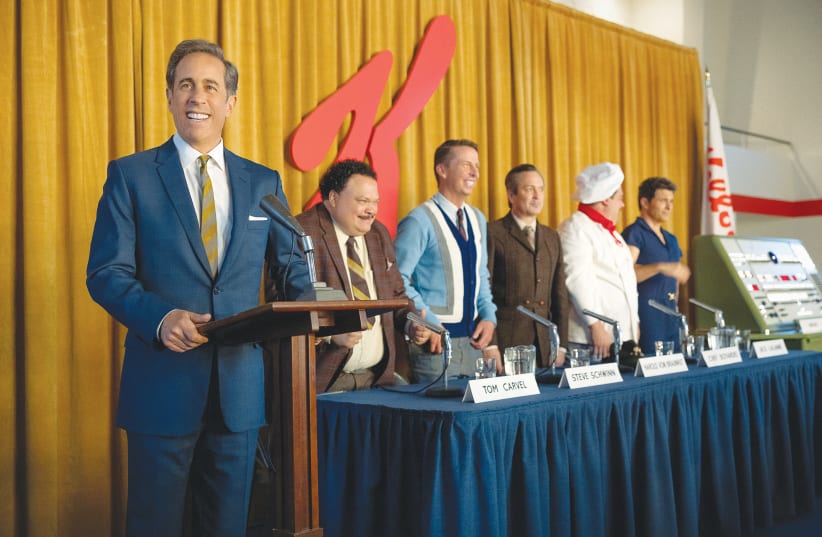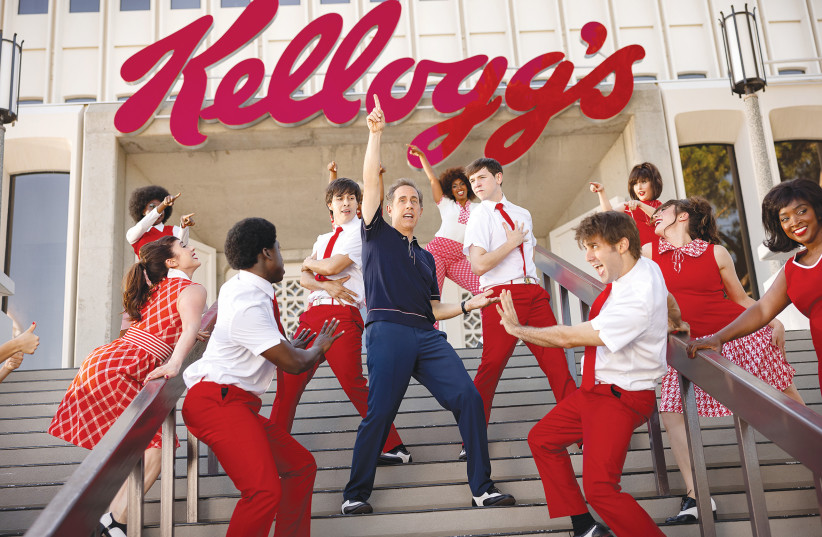Jerry Seinfeld spent a lot of time during his iconic series Seinfeld munching cereal. It turns out that those boxes and bowls weren’t random props: He takes breakfast food very seriously. So seriously, in fact, that his new movie for Netflix, Unfrosted, is all about the rivalry between the Kellogg’s and Post food companies to create Pop Tarts.
It’s silly – and, if you’re in the right mood, it’s fun. It reminds us that much of the comedy on Seinfeld was pretty goofy, which is part of why people loved it. Asked by National Public Radio recently what he wanted people to take away from Unfrosted – which he wrote and directed, and in which he stars – Seinfeld replied, “I don’t want them to take anything away from it. I want them to just watch it and hopefully get a laugh or two. That’s it.”
Unfrosted is a loving homage to American pop culture in the early 60s, which was also obsessively celebrated and analyzed in Wes Anderson’s movie, Asteroid City. But watching Unfrosted is like holding a fun-house mirror up to Asteroid City; compared with Anderson’s knowing hipster reverence, Seinfeld sees this era as a circus of excess and downright weirdness to be joyfully mocked – and to be presented as accessibly as possible.
It’s set in Battle Creek, Michigan in 1963 and focuses on Bob Cabana (Seinfeld), an executive at Kellogg’s, which is hell-bent on creating what would become the Pop Tart, a quest that takes on added intensity after he discovers that Post is close to inventing their own fruit-filled breakfast treat.
Nothing really carries any weight in a story where the end is a foregone conclusion and it’s all just an excuse to satirize the pop culture of the time, but that doesn’t mean you won’t enjoy it.
SEINFELD HAS always surrounded himself with talented actors, and this is no exception. Amy Schumer plays the head of the Post Corporation and Melissa McCarthy portrays Stan, supposedly a genius inventor whom Cabana hires away from NASA. Stan brings in a group of experts who she claims all have the right stuff: mumbling ice-cream entrepreneur Tom Carvel (Adrian Martinez); bicycle mogul Steve Schwinn (Jack McBrayer of 30 Rock); Sea-Monkeys inventor Harold Von Braunhut (Thomas Lennon) – who had a really weird life story that deserves to be Googled; Chef Boyardee (Bobby Moynihan); and exercise maven Jack LaLanne (James Marsden).
There’s also a subplot about cereal mascots rebelling, and they are led by Hugh Grant, who plays Thurl Ravenscroft, a Shakespearean actor reduced to resentfully portraying Tony the Tiger. Their rallying cry as they picket is, “What do we want? Dignity! When do we want it? Soon!”
Every little bit of early 60s weirdness gets its moment, including President John F. Kennedy (Bill Burr), who can’t wait for Cabana and Stan to leave so he can see the Doublemint twins, and Russian leader Krushchev (Dean Norris), whom the Post executives woo with a borscht-based cereal brand. Peter Dinklage of Game of Thrones is on hand as the menacing head of a milk cartel.
The funniest scene for Mad Men fans will be when Jon Hamm, who played Don Draper on that series, shows up with castmate John Slattery, and presents a sexy ad campaign for Pop Tarts, saying, “It begins with two beating hearts. Like two pastries, alone, in the dark, sharing a single foil wrapper.” When Cabana suggests this is not appropriate for a product aimed at children, Hamm lashes out in trademark Don Draper style, which puzzles Cabana, who asks, “Why are they so mean? It’s just advertising.”
While Unfrosted will undoubtedly amuse Americans of a certain age, I watched it with a 20-something American-Israeli and a native-born Israeli, who didn’t get it and gave up after five minutes.
A Man in Full
I had high hopes for the Netflix series A Man in Full, an adaptation of Tom Wolfe’s novel, but like the movie adaptation of Wolfe’s The Bonfire of the Vanities, it captures nothing of what made the book great. If it inspires people to read A Man in Full, a dissection of social and racial politics in 1990s Atlanta, that would be the best outcome, but I imagine most people who see the series and haven’t read the novel will wonder why anyone decided to adapt it.
The series obviously can’t incorporate the inner thoughts of the characters, and Wolfe had a ferocious gift for describing people’s secret vanity and worries. Instead, it focuses on the blowhard, unscrupulous financier Charlie Croker (Jeff Daniels) and his associates, but also features a rare, sympathetic hero in a Wolfe novel, Conrad (Jon Michael Hill), whom the series creators have reimagined as Black.
Conrad works in a warehouse that, in the book, is owned by Croker, while in the series, Conrad’s wife is Croker’s secretary. This change could have been an interesting way to deal with current racial politics, but somehow the script provides no insight into this issue, except to note that police are brutal towards Black men.
We have barely met Conrad before he is arrested for getting into a fight with a police officer, who pushes him as he pleads with the officer to stop towing his car. In the book, we had hundreds of pages to get to know Conrad and learn how he couldn’t get a break his whole life – and why losing the car even for a few days would be enough to destroy it. The pages in the novel when he tries to get his car back from the lot are among the best Wolfe has ever written, and that’s saying something; here, it’s just a brief scene where a guy gets arrested.
It’s certainly worth reading or re-reading Bonfire (which deals in part with antisemitism and tensions between blacks and Jews in 1980s New York) and A Man in Full, as well as Wolfe’s journalism, notably “Radical Chic,” in which he savagely poked fun at the spectacle of Leonard Bernstein hosting a bunch of liberals at a fund-raiser for the Black Panthers in 1969.
In that essay, Wolfe noted the capacity of Jewish liberals to ignore left-wing antisemitism, and quoted articles in a magazine called Black Power that said, “Zionism (Kosher Nationalism) + Imperialism = Fascism” and a poem that included the line “...couldn’t kill the Jews too soon.” I’ve often wished over the last few months that Wolfe, who died in 2018, could come back to life and write a new essay about the current version of radical chic on college campuses. (See review, Page 6)
Are You There God? It’s Me, Margaret
Another wonderful book that was brought to the screen much more successfully is Judy Blume’s coming-of-age novel Are You There God? It’s Me, Margaret, which has just become available on Netflix. Blume was an adviser on the film and worked with director Kelly Fremon Craig and producer James L. Brooks (who created The Mary Tyler Moore Show, Taxi, and The Simpsons) to bring this classic story to life.
Hacks
The third season of Hacks, the Emmy-winning series about Deborah (Jean Smart), an aging female stand-up trying to stay on top and Ava (Hannah Einbinder), the canceled 20-something comedy writer she hires to revamp her act, just started running on Yes VOD, Hot VOD, and Next TV and is showing on Wednesdays on Hot 3 at 8:15 p.m. Episodes were not yet released at press time, but there is a year-long time jump from season two. Both characters have moved on, but are inevitably drawn back together, so that they can bring out the best and worst in each other.
Entitled
Brett Gelman of Stranger Things, who made us laugh when he played a Berkeley professor proving to his woke students why Jesus wasn’t really Jewish on Eretz Nehederet (A Wonderful Country) last winter, is now starring in a new series, Entitled, which is available on Cellcom TV. Gelman plays an American whose British, aristocratic wife has just died and he goes to live in her Gothic mansion, where he meets her eccentric, estranged family. Sounds like a perfect role for Gelman, who already played an American with a British wife to great comic effect in Fleabag.

